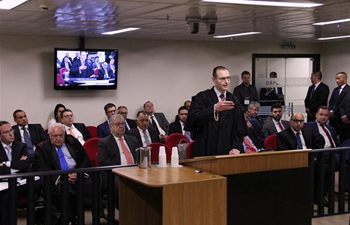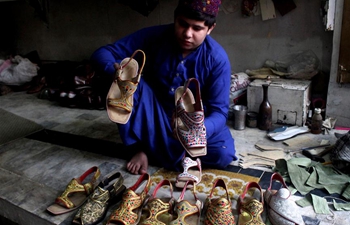DAVOS, Switzerland, Jan. 24 (Xinhua) -- France and Germany on Wednesday unanimously defended their collective stance on making a stronger Europe, amid fears that more idea divisions would emerge between the two sides of the Atlantic as U.S. President Donald Trump is set to make his Davos debut.
"France is back. France is back at the core of Europe, because we will never have any French success without a European success," said French President Emannual Macron in a keynote speech during this years' World Economic Forum.
"All of these initiatives and reform have a natural counterpart which is European strategy," he said, calling for more "ambition" in the European Union (EU).
"Those who don't want to move forwards should not block the most ambitious in the room," he added.
The "EU should find its role in a globalized world and put social cohesion above an often-observed obsession with growth," he noted, urging a 10-year strategy of EU listing common objectives in the fields of environment, energy, social cohesion and defense.
France and Germany have traditionally been regarded as the driving force behind the European integration, but the Brexit spillovers and the rising far-rights on the continent have cast shadows on their efforts to some extent.
Echoing Macron in her speech Wednesday, German Chancellor Angela Merkel also talked about her vision for Europe's future, saying that the EU "needs to take more responsibility, we need to take our destiny into our own hands."
"Multilateralism is under threat and have we actually learned the lessons of history? We haven't really," she said, urging closer cooperation in the EU to solve problems in Europe.
Specifically, Merkel called for more actions on digitalization rather than "debating philosophical issues", saying that it was too slow in EU to decide how to deal with big data, which has made Europe lag behind.
"We now have to re-oriented economic policies, creating a digital single market," she pointed out, reminding that Europe is under great pressure due to the presence of large American companies.
Meanwhile, Merkel also called for efforts to tackle fractured capital market by establishing capital markets union, as well as completing banking union, so as to weather the crisis at an early stage.
Following a series of unexpected events on the global stage including Brexit and the election of Trump as U.S. President, the world's attention is focused on France and Germany, wondering how they will respond to the rise of populism, protection and sentiment against globalization in Europe.
Despite declarations of good intentions between Paris and Berlin, some media warned that Macron and Merkel might have envisioned different structures in the EU, which might put the two countries at odds.
Der Spiegel, a German weekly news magazine, said earlier that Macron has long wanted a union that gives Brussels greater powers, instead of seeing Berlin "steer the wheel."
The new star of European politics had earlier suggested the establishment of a European finance ministerial post and a budget for the eurozone, something widely seen as an attempt to transfer more legitimacy from national governments to the EU and could raise eyebrows in Berlin.

















